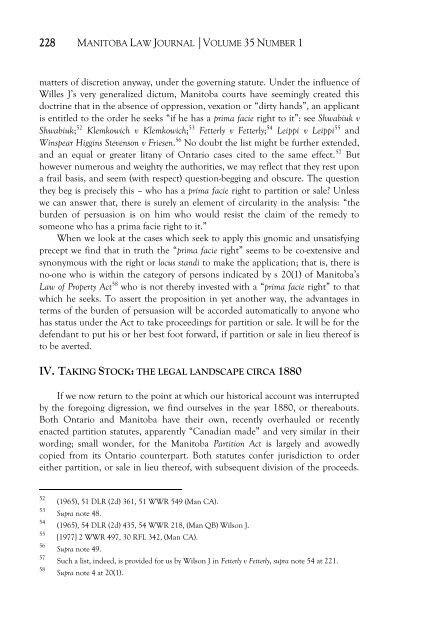Download PDF - Robson Hall Faculty of Law
Download PDF - Robson Hall Faculty of Law
Download PDF - Robson Hall Faculty of Law
You also want an ePaper? Increase the reach of your titles
YUMPU automatically turns print PDFs into web optimized ePapers that Google loves.
228 MANITOBA LAW JOURNAL |VOLUME 35 NUMBER 1<br />
matters <strong>of</strong> discretion anyway, under the governing statute. Under the influence <strong>of</strong><br />
Willes J’s very generalized dictum, Manitoba courts have seemingly created this<br />
doctrine that in the absence <strong>of</strong> oppression, vexation or “dirty hands”, an applicant<br />
is entitled to the order he seeks “if he has a prima facie right to it”: see Shwabiuk v<br />
Shwabiuk; 52 Klemkowich v Klemkowich; 53 Fetterly v Fetterly; 54 Leippi v Leippi 55 and<br />
Winspear Higgins Stevenson v Friesen. 56 No doubt the list might be further extended,<br />
and an equal or greater litany <strong>of</strong> Ontario cases cited to the same effect. 57 But<br />
however numerous and weighty the authorities, we may reflect that they rest upon<br />
a frail basis, and seem (with respect) question-begging and obscure. The question<br />
they beg is precisely this – who has a prima facie right to partition or sale Unless<br />
we can answer that, there is surely an element <strong>of</strong> circularity in the analysis: “the<br />
burden <strong>of</strong> persuasion is on him who would resist the claim <strong>of</strong> the remedy to<br />
someone who has a prima facie right to it.”<br />
When we look at the cases which seek to apply this gnomic and unsatisfying<br />
precept we find that in truth the “prima facie right” seems to be co-extensive and<br />
synonymous with the right or locus standi to make the application; that is, there is<br />
no-one who is within the category <strong>of</strong> persons indicated by s 20(1) <strong>of</strong> Manitoba’s<br />
<strong>Law</strong> <strong>of</strong> Property Act 58 who is not thereby invested with a “prima facie right” to that<br />
which he seeks. To assert the proposition in yet another way, the advantages in<br />
terms <strong>of</strong> the burden <strong>of</strong> persuasion will be accorded automatically to anyone who<br />
has status under the Act to take proceedings for partition or sale. It will be for the<br />
defendant to put his or her best foot forward, if partition or sale in lieu there<strong>of</strong> is<br />
to be averted.<br />
IV.<br />
TAKING STOCK: THE LEGAL LANDSCAPE CIRCA 1880<br />
If we now return to the point at which our historical account was interrupted<br />
by the foregoing digression, we find ourselves in the year 1880, or thereabouts.<br />
Both Ontario and Manitoba have their own, recently overhauled or recently<br />
enacted partition statutes, apparently “Canadian made” and very similar in their<br />
wording; small wonder, for the Manitoba Partition Act is largely and avowedly<br />
copied from its Ontario counterpart. Both statutes confer jurisdiction to order<br />
either partition, or sale in lieu there<strong>of</strong>, with subsequent division <strong>of</strong> the proceeds.<br />
52<br />
53<br />
54<br />
55<br />
56<br />
57<br />
58<br />
(1965), 51 DLR (2d) 361, 51 WWR 549 (Man CA).<br />
Supra note 48.<br />
(1965), 54 DLR (2d) 435, 54 WWR 218, (Man QB) Wilson J.<br />
[1977] 2 WWR 497, 30 RFL 342, (Man CA).<br />
Supra note 49.<br />
Such a list, indeed, is provided for us by Wilson J in Fetterly v Fetterly, supra note 54 at 221.<br />
Supra note 4 at 20(1).














